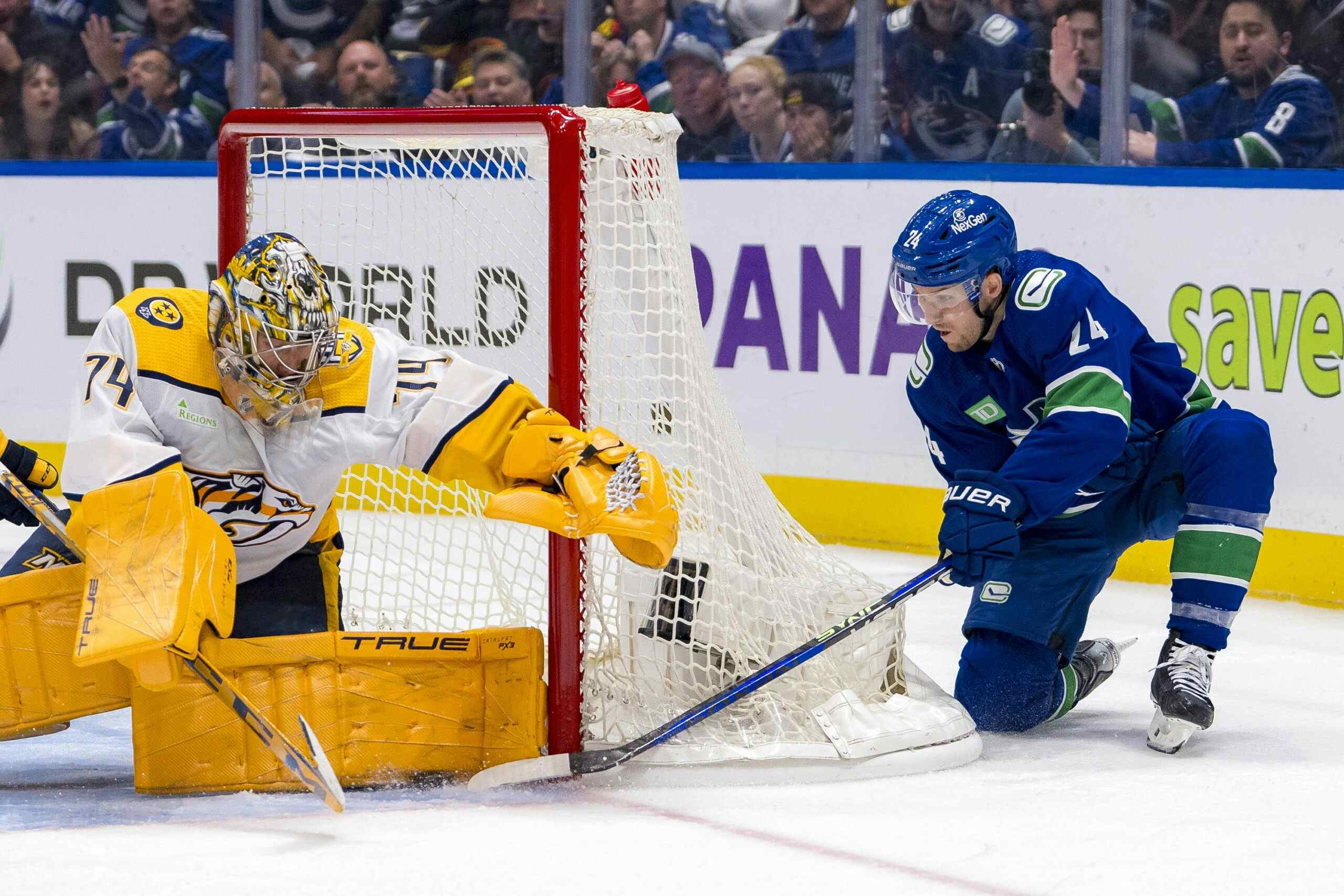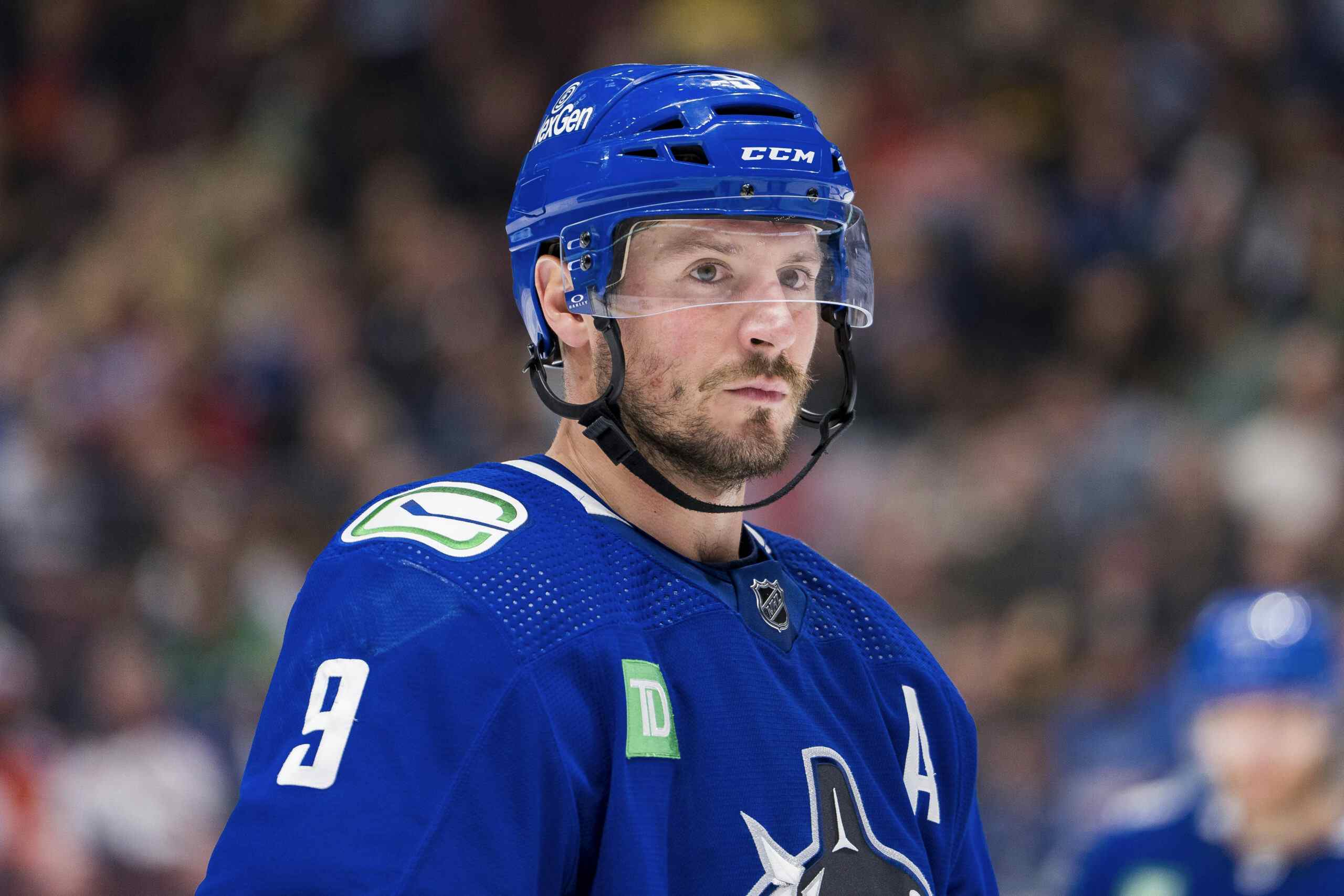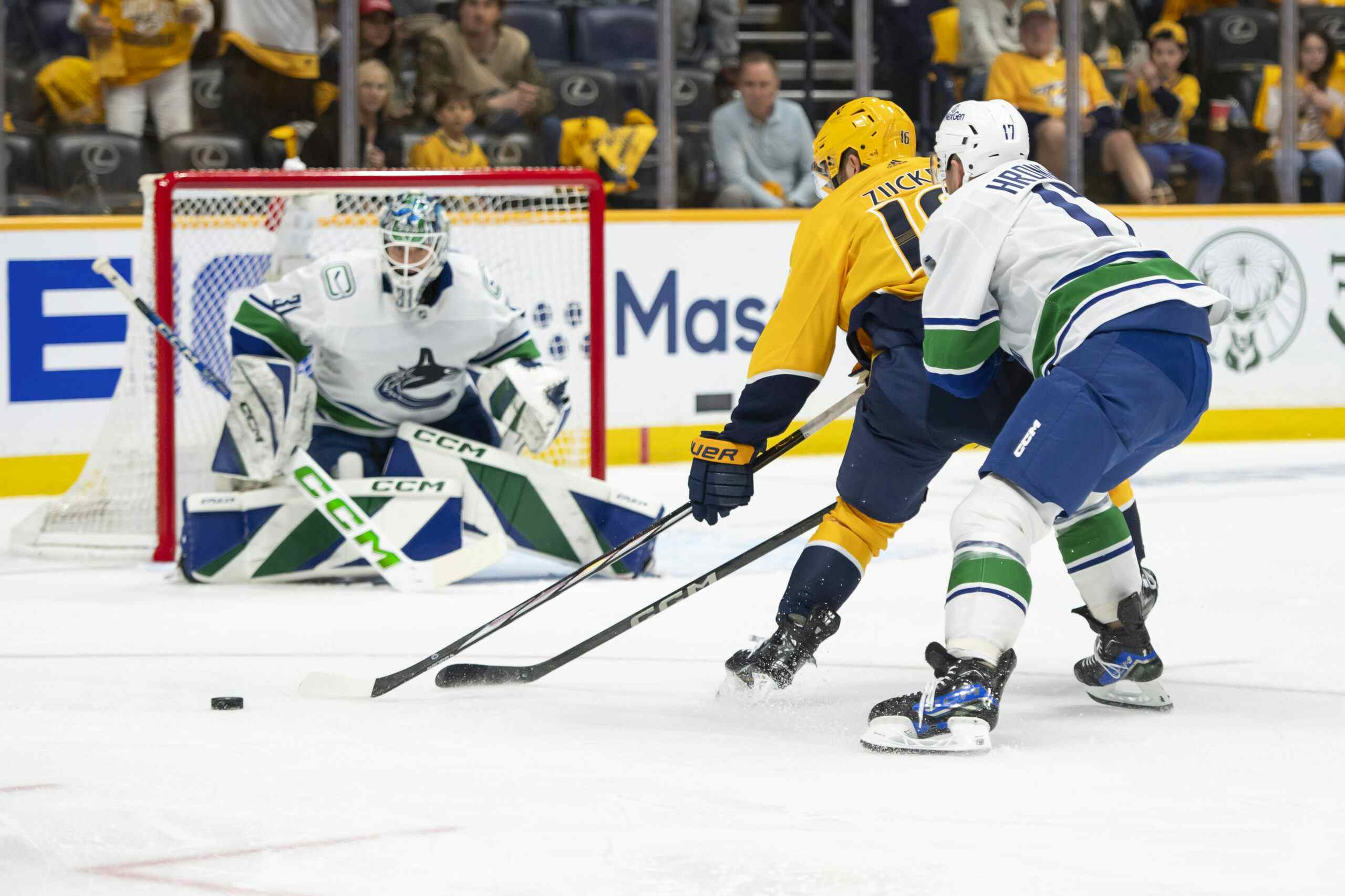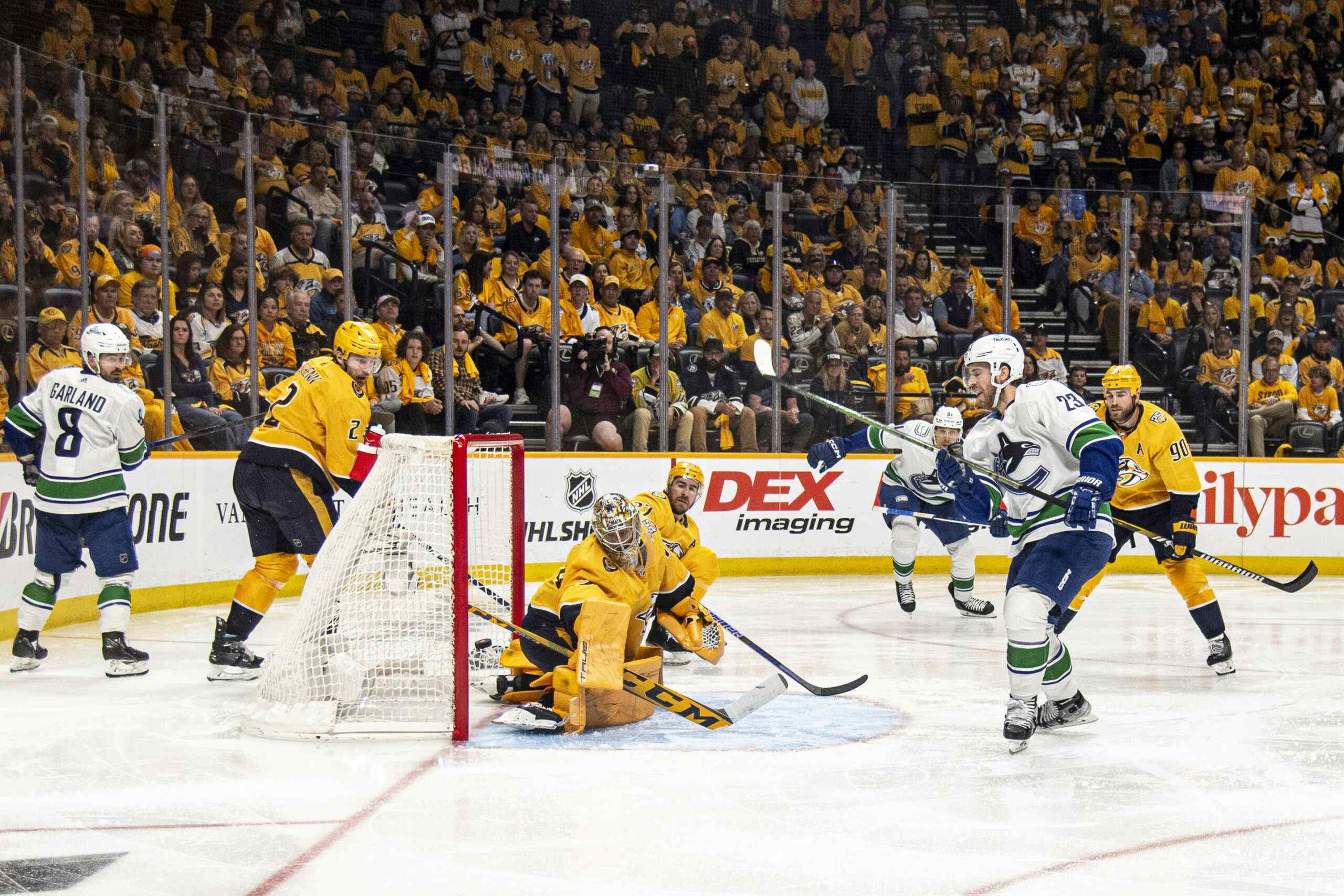The Booth Trade and Sentimental Value
By Cam Charron
12 years ago
Will the Canucks miss Samuelsson’s leadership?
The Vancouver Canucks traded a couple of spare parts for a 26-year old goal-scorer over the weekend and the initial reaction to the trade was mixed. Mixed, as in, people’s opinions on the deal ranged somewhere from “okay, now the Canucks have a pretty good second line” to “what on earth is Dale Tallon thinking?”
This deal isn’t at all a masterstroke by Canucks General Manager Mike Gillis, but he did manage to land a pretty damn impressive piece. General reaction is that the Canucks absolutely fleeced the Panthers. As Scott Reynolds asks his readers on the Oilers blog Copper n Blue “So is Mike Gillis just smarter than everyone else?” Reynolds concluded that thought with “He just might be. There’s no doubt that this trade makes the Canucks better today, and there’s a reasonably good chance that it works long term too.”
The range of analysis bottomed-out a little with a comment on Florida Panther SBN blog Litter Box Cats “Fk tallon and the rest of management! here we go again trading away good players for nothing good in return!! I’m fkn fed up of this team and their bull! they give Booth 6 games to prove himself wtf is that!?”
Sort of a steal for the Canucks. I’ll explain why this is such a great trade when I respond to the dissenting voice of Mike Gillis’ Blackberry return button, Iain MacIntyre of the Vancouver Sun.
There is no such thing in sports as a sure thing.As an organization, the Vancouver Canucks try to leave nothing to chance. The National Hockey League team assesses, monitors and micro-manages every aspect of their players’ preparation and performance. Nothing on the Canucks happens by accidentBut try as progressive general manager Mike Gillis does to out-plan and out-think everyone in order to reduce uncertainty and risk, his biggest decisions — like Saturday’s shock trade — are fundamentally fraught with them.”
Remember, Iain MacIntyre was the guy who wrote all about how Mike Gillis was just like Billy Beane a week after Moneyball came out, in that Gillis looks for undervalued assets and completely exploits people. I’ll refer back to the October 7 column periodically.
But what MacIntyre has done here is set the stage for a column about how nothing in hockey is a sure thing and that excitement needs to be contained over this trade.
The David Booth deal is no slam-dunk. Sorry, but almost no trades are.”
Or the exact opposite of restraint. It looks like he’s about to criticize the deal.
When you ship out two guys who are on the wrong-side of 30 and unlikely to combine to score 30 goals for a younger player who will score 25, you do it, and the trade is absolutely a slam dunk. You do it even if you have to eat the salary of another player, and you especially do it if you get your own third-round pick back which allows you to possibly sign a big fish to an offer sheet this offseason.
The 26-year-old winger Gillis acquired after the Canucks’ matinee win against the Minnesota Wild is a solid, second-line scorer in the NHL who might yet get even better.At this stage, there isn’t much doubt Booth is a regular-season upgrade on Mikael Samuelsson, the prime component Gillis surrendered to the Florida Panthers in the multi-player deal.
There are 90 first-line players in the National Hockey League. The 90th best scorer had 21 goals last season. David Booth scored 23 goals last season. Do the math. At the very least, he’s a low-rung first liner, high-end second liner. Not a “solid, second-line scorer”. Unless “solid” has suddenly become a synonym for “really good”.
Then you come to the second paragraph. “Regular-season upgrade” is written. I wince. Is this going where I think it is?
“Samuelsson was also a key voice in the Canucks’ leadership group, which enjoys a lot of autonomy in the dressing room but wasn’t consulted on this trade. And Samuelsson’s 92 career playoff games are 92 more than Booth has played.”
Yes it is. KILL IT, KILL IT WITH FIRE!
Look, if Samuelsson’s leadership is his biggest asset, I’m sure there’s nothing more he’d enjoy doing than giving the Canucks pep-talks via Skype during the playoffs while the Florida Panthers have long since packed their bags at the end of the season. I don’t know what Iain MacIntyre thinks are the differences between regular season games and playoff games, but in playoff games, the object of the game is still to score more goals than the other team.
Naturally, doesn’t that make it fit to sign the best players who can score you the most goals? When David Booth was 23, he scored 30 goals in the NHL. When Mikael Samuelsson was 23, he scored 30 goals in the AHL. When Mikael Samuelsson was 26, Booth’s current age, he scored just 3 goals in 37 games for the Florida Panthers and had never played a playoff game. He was Moneypucked aboard an already very strong Detroit team and fit in well in a secondary scoring role.
Sound familiar? Leadership, or circumstance? What was really the driving force behind those 92 playoff games?
“The bottom line is the Canucks are younger, faster and a little more dangerous around the net with Booth.”
Sweet. I agree.
“And that would make the deal almost a slam dunk except for this: Booth has nearly $18 million US and four years remaining on his contract and has suffered a pair of serious concussions two seasons ago.”
So we’re away from the “Now the Canucks don’t have a leader” to “now the Canucks have a spending problem.” Sure, if Francesco Aquilini’s silk pockets weren’t lined with gold coins already, I’m certain that he wouldn’t mind eating a big cap hit if Booth’s concussion problems reciprocate. But he played 82 games last year. Come on.
As tweeted by Leafs Nation writer @67sound Saturday night, “I’m guessing Tallon knows Booth has 0 goals and a -6. I’m guessing Gillis knows Booth has 14 shots and a PDO of 842.”
PDO is an excellent measurement of luck. Multiply the sum of a player’s on-ice shooting percentage by his on-ice save percentage by 1000 and you come up with a number that describes whether a player is the beneficiary or getting burned by bad bounces. Over 1000 is unsustainably high, under 1000 is unsustainably low. Last season, Booth had the 13th worst PDO in the NHL, partly due to playing in front of inept-goaltending (Florida goalies only saved .889% of shots when Booth was on the ice). That shouldn’t be an issue anymore (unless The Province’s editorial board wins the Canucks “GM For A Day” contest) so Booth will look a lot better than a -37 in his last 88 hockey games, on the Canucks.
Remember when MacIntyre quoted Mike Gillis as saying that applying sabermetrics to hockey “doesn’t work”? (It’s in the link above, and I’m sure Gillis was lying, and that MacIntyre isn’t well schooled enough in advanced statistics to grill the Canucks GM too hard on the issue). Well last season, Booth had a Corsi ON/60 rating of 3.94. He did this despite not seeing a whole lot of extra offensive zone starts (49.9% rate) and had a pretty high Corsi Rel QoC (quality of competition) of 0.597.
A slow start after a down-season in which Booth shot a career-low 8.2% (career-low over a full season), this was a player ripe for the picking. Gillis bought low and got David Booth for a scoring winger who doesn’t score anymore, and an overpriced hockey player that may as well have come as the toy in a Happy Meal.
This was a great deal. Booth is a good young player with tremendous upside. Don’t be fooled by his +/- number, Booth drives play and isn’t a defensive liability. Finally, he won’t be called upon to carry the fortunes of an entire NHL team. If this isn’t a slam-dunk, MacIntyre doesn’t know much about basketball.
In chess’ endgame, this is moving a pawn, otherwise worthless, forward one space to the back row and picking up something useful. You aren’t guaranteed a checkmate, but you’re a hell of a lot better off than if you had kept that pawn for its sentimental value.
Recent articles from Cam Charron





